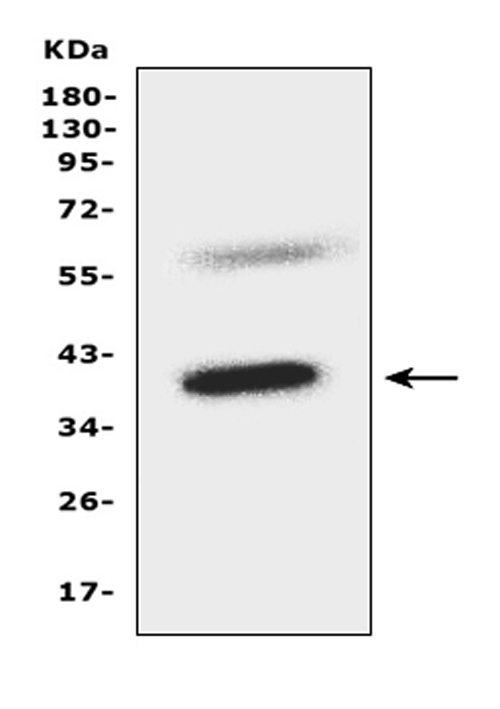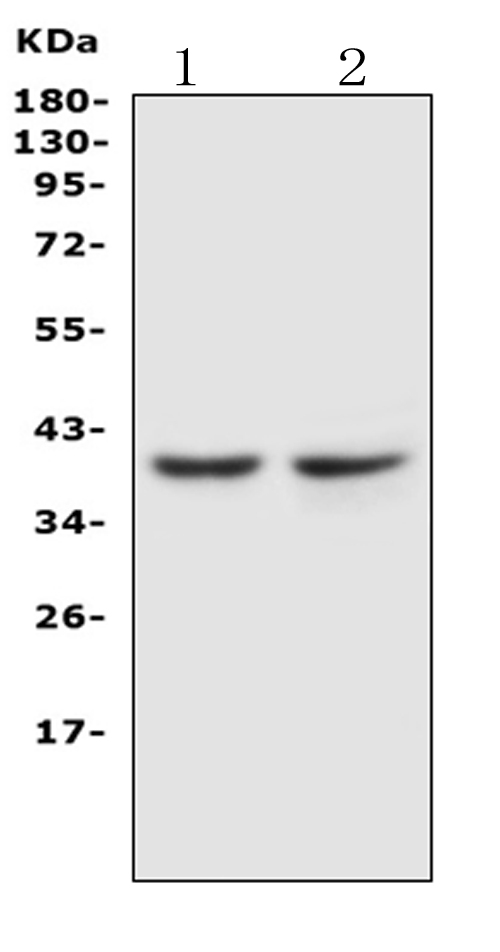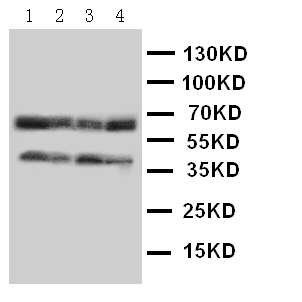Product Info Summary
| SKU: | PA1016 |
|---|---|
| Size: | 100 μg/vial |
| Reactive Species: | Human, Mouse, Rat |
| Host: | Rabbit |
| Application: | WB |
Customers Who Bought This Also Bought
Product info
Product Name
Anti-C-C chemokine receptor type 5 CCR5 Antibody
SKU/Catalog Number
PA1016
Size
100 μg/vial
Form
Lyophilized
Description
Boster Bio Anti-C-C chemokine receptor type 5 CCR5 Antibody catalog # PA1016. Tested in WB applications. This antibody reacts with Human, Mouse, Rat.
Storage & Handling
Store at -20˚C for one year from date of receipt. After reconstitution, at 4˚C for one month. It can also be aliquotted and stored frozen at -20˚C for six months. Avoid repeated freeze-thaw cycles.
Cite This Product
Anti-C-C chemokine receptor type 5 CCR5 Antibody (Boster Biological Technology, Pleasanton CA, USA, Catalog # PA1016)
Host
Rabbit
Contents
Each vial contains 5mg BSA, 0.9mg NaCl, 0.2mg Na2HPO4, 0.05mg Thimerosal, 0.05mg NaN3.
Clonality
Polyclonal
Isotype
Rabbit IgG
Immunogen
A synthetic peptide corresponding to a sequence at the N-terminus of human CCR5, different from the related rat sequence by two amino acids.
*Blocking peptide can be purchased. Costs vary based on immunogen length. Contact us for pricing.
Cross-reactivity
No cross-reactivity with other proteins
Reactive Species
PA1016 is reactive to CCR5 in Human, Mouse, Rat
Applications
PA1016 is guaranteed for WB Boster Guarantee
Observed Molecular Weight
40 kDa
Calculated molecular weight
40.524kDa
Background of CCR5
Human CC chemokine receptor 5 (CCR5), which is 17.5 kb from the CMKBR2 gene, encodes a 352-amino acid protein with a calculated molecular mass of 40,600 Da. It is organized into four exons and two introns. Human CCR5 is a co-receptor for macrophage-tropic strains of human immunodeficiency virus (HIV)-1 and is expressed by bone-marrow-derived cells. CCR5 is expressed on neurons, astrocytes, and microglia in the central nervous system, and on epithelium, endothelium, vascular smooth muscle and fibroblasts in other tissues. Functionally, CCR5 mediates the activation of cells by the chemokines macrophage inflammatory protein-1alpha, macrophage inflammatory protein-1beta, and RANTES, and serves as a fusion cofactor for macrophage-tropic strains of human immunodeficiency virus type 1.
Antibody Validation
Boster validates all antibodies on WB, IHC, ICC, Immunofluorescence, and ELISA with known positive control and negative samples to ensure specificity and high affinity, including thorough antibody incubations.
Innovating Scientists Reward
If you are the first to review this product, or if you have results for a special sample, species or application this product is not validated in, share your results with us and receive product credits you can use towards any Boster products! Applicable to all scientists worldwide.
Submit A Review
Assay dilution & Images
Reconsitution
Add 0.2ml of distilled water will yield a concentration of 500ug/ml.
Assay Dilutions Recommendation
The recommendations below provide a starting point for assay optimization. The actual working concentration varies and should be decided by the user.
Western blot, 0.1-0.5μg/ml, Human, Mouse, Rat
Validation Images & Assay Conditions

Click image to see more details
Anti-CCR5 antibody, PA1016, Western blotting
All lanes: Anti CCR5 (PA1016) at 0.5ug/ml
WB: Mouse Liver Tissue Lysate at 50ug
Predicted bind size: 40KD
Observed bind size: 40KD

Click image to see more details
Anti-CCR5 antibody, PA1016, Western blotting
Lane 1: JURKAT Cell Lysate
Lane 2: COLO320 Cell Lysate
Protein Target Info & Infographic
Gene/Protein Information For CCR5 (Source: Uniprot.org, NCBI)
Gene Name
CCR5
Full Name
C-C chemokine receptor type 5
Weight
40.524kDa
Superfamily
G-protein coupled receptor 1 family
Alternative Names
C-C CKR-5; C-C motif chemokine receptor 5 A159A; CCCKR5; CC-CKR-5FLJ78003; CCR5; CCR-5; CD195 antigen; CD195; chemokine (C-C motif) receptor 5; chemokine receptor CCR5; chemr13; CKR5; CKR-5; HIV-1 fusion coreceptor; IDDM22CMKBR5C-C chemokine receptor type 5 CCR5 CC-CKR-5, CCCKR5, CCR-5, CD195, CKR-5, CKR5, CMKBR5, IDDM22 C-C motif chemokine receptor 5 C-C chemokine receptor type 5|C-C motif chemokine receptor 5 A159A|HIV-1 fusion coreceptor|chemokine (C-C motif) receptor 5|chemokine receptor CCR5|chemokine recptor CCR5 Delta32|chemr13
*If product is indicated to react with multiple species, protein info is based on the gene entry specified above in "Species".For more info on CCR5, check out the CCR5 Infographic

We have 30,000+ of these available, one for each gene! Check them out.
In this infographic, you will see the following information for CCR5: database IDs, superfamily, protein function, synonyms, molecular weight, chromosomal locations, tissues of expression, subcellular locations, post-translational modifications, and related diseases, research areas & pathways. If you want to see more information included, or would like to contribute to it and be acknowledged, please contact [email protected].
Specific Publications For Anti-C-C chemokine receptor type 5 CCR5 Antibody (PA1016)
Hello CJ!
PA1016 has been cited in 2 publications:
*The publications in this section are manually curated by our staff scientists. They may differ from Bioz's machine gathered results. Both are accurate. If you find a publication citing this product but is missing from this list, please let us know we will issue you a thank-you coupon.
Study on CCR5 analogs and affinity peptides
Li G, Xu H, Zhu S, Xu W, Qin S, Liu S, Tu G, Peng H, Qiu S, Yu S, Zhu Q, Fan B, Zheng C, Li G, Liang S. Brain Res Bull. 2013 Jan;90:79-87. Doi: 10.1016/J.Brainresbull.2012.10.002. Epub 2012 Oct 9. Effects Of Neferine On Ccl5 And Ccr5 Expression In...
Recommended Resources
Here are featured tools and databases that you might find useful.
- Boster's Pathways Library
- Protein Databases
- Bioscience Research Protocol Resources
- Data Processing & Analysis Software
- Photo Editing Software
- Scientific Literature Resources
- Research Paper Management Tools
- Molecular Biology Software
- Primer Design Tools
- Bioinformatics Tools
- Phylogenetic Tree Analysis
Customer Reviews
Have you used Anti-C-C chemokine receptor type 5 CCR5 Antibody?
Submit a review and receive an Amazon gift card.
- $30 for a review with an image
Be the first to review Anti-C-C chemokine receptor type 5 CCR5 Antibody
*The first user to submit a review for a product is eligible for Boster's Innovating Scientists Reward, which gives product credits. This is in addition to the gift card reward.
Customer Q&As
Have a question?
Find answers in Q&As, reviews.
Can't find your answer?
Submit your question
4 Customer Q&As for Anti-C-C chemokine receptor type 5 CCR5 Antibody
Question
We want using your anti-CCR5 antibody for positive regulation of cytosolic calcium ion concentration studies. Has this antibody been tested with western blotting on mouse liver tissue? We would like to see some validation images before ordering.
Verified Customer
Verified customer
Asked: 2020-02-25
Answer
I appreciate your inquiry. This PA1016 anti-CCR5 antibody is validated on jurkat cell lysate, colo320 cell lysate, mouse liver tissue, tissue lysate. It is guaranteed to work for WB in human, mouse, rat. Our Boster guarantee will cover your intended experiment even if the sample type has not been be directly tested.
Boster Scientific Support
Answered: 2020-02-25
Question
We are currently using anti-CCR5 antibody PA1016 for rat tissue, and we are happy with the WB results. The species of reactivity given in the datasheet says human, mouse, rat. Is it true that the antibody can work on dog tissues as well?
Verified Customer
Verified customer
Asked: 2019-10-16
Answer
The anti-CCR5 antibody (PA1016) has not been validated for cross reactivity specifically with dog tissues, but there is a good chance of cross reactivity. We have an innovator award program that if you test this antibody and show it works in dog you can get your next antibody for free. Please contact me if I can help you with anything.
Boster Scientific Support
Answered: 2019-10-16
Question
Our lab were content with the WB result of your anti-CCR5 antibody. However we have observed positive staining in visceral pleura cell membrane using this antibody. Is that expected? Could you tell me where is CCR5 supposed to be expressed?
Verified Customer
Verified customer
Asked: 2019-07-15
Answer
According to literature, visceral pleura does express CCR5. Generally CCR5 expresses in cell membrane. Regarding which tissues have CCR5 expression, here are a few articles citing expression in various tissues:
Macrophage, Pubmed ID: 8663314
Boster Scientific Support
Answered: 2019-07-15
Question
We have observed staining in human visceral pleura. Are there any suggestions? Is anti-CCR5 antibody supposed to stain visceral pleura positively?
J. Thomas
Verified customer
Asked: 2017-11-29
Answer
According to literature visceral pleura does express CCR5. According to Uniprot.org, CCR5 is expressed in visceral pleura, macrophage, among other tissues. Regarding which tissues have CCR5 expression, here are a few articles citing expression in various tissues:
Macrophage, Pubmed ID: 8663314
Boster Scientific Support
Answered: 2017-11-29





